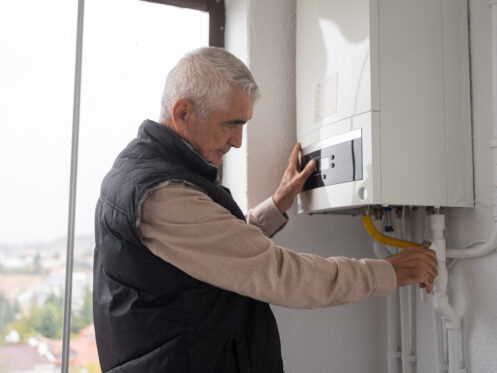When choosing a new water heater for your home, you have options. Traditional tank water heaters have been the most common type of water heating system for decades, but tankless models are becoming increasingly popular. Depending on your hot water needs, you may find tank or tankless a better fit for your home.
Tank Water Heaters
Tank-style water heaters include a holding tank or reservoir. Water is heated as it enters the reservoir and is kept hot inside the tank. When you turn on your hot water tap, you’ll get heated water directly from the tank. The water heater runs continuously to keep the water hot and refills as needed. You can find tank water heaters in various sizes. Some smaller tanks have a capacity of as little as 30 gallons of water. The larger tanks have a capacity of about 80 gallons.
Tankless Water Heaters
Tankless water heaters use a heating element to create hot water. When you turn on your faucet, water runs along the heating element. The water is heated as it moves along the heating element and comes straight to the tap. You get hot water on demand each time you turn on the faucet. Because there is no tank, there are no different sizes to choose from regarding capacity.
Comparing Tank and Tankless
So which style is better for you and your home? Only you can decide that although you might find some help from the following information and our dedicated team of plumbers. Every home has different needs when it comes to hot water. You may also want to consider long-term ups and downs and your upfront budget when deciding on a new water heater. Read on for some of the pros and cons of each type to better help you in making your decision.
Energy Efficiency
A tank water heater runs continuously to keep the water inside the holding tank at the required temperature. You can find energy-efficient models, meaning they’ll use slightly less energy than other non-efficient water heaters. However, tankless water heaters win by a landslide in terms of energy efficiency. A tankless model can save you up to 35% on energy over traditional tank-style heaters. The reason behind this is that tankless water heaters only use energy when hot water is being run from the faucet. The water crosses over the heating element and moves on to the tap. Tankless models have no holding reservoir requiring constant heating. If energy efficiency and the cost of your utility bills are major factors in your decision, a tankless water heater is going to give you the best benefits.
Hot Water Supply
When choosing a tank water heater for your home, you have different capacity options to choose from. You may opt for a smaller tank if you have a small family or live alone and have very little hot water needs. If you have a large family and use a lot of hot water, you’ll want a large tank to keep from running out of hot water. When using a tank-style water heating system, you have the amount of hot water sitting in your tank until it can heat and refill. This means that multiple showers, laundry, and dishes may not be possible if your tank isn’t large enough.
With a tankless water heater, you have hot water on demand at all times. Since the water is heated as it moves along the heating element, you never have to wait for a tank to refill with hot water. Tankless water heaters are an ideal choice for larger families who use a great deal of hot water daily. With this system, you’ll never run out of hot water, no matter how much you use.
Maintenance Costs
Tank water heaters require maintenance from time to time to remove sediment and minerals. As water sits in the holding tank, sediment and minerals can build up inside the tank. This can come through your tap and create a potential health risk, not to mention dirty water. Experts recommend flushing your tank at least annually, sometimes more depending on the quality of the water where you live.
Tankless water heaters have no holding tank for sediment and minerals to build up in. Maintenance costs for a tankless water heater are little to none.
Space
Even small tank water heaters take up precious real estate inside your home. The holding tank, even a slim one, must sit somewhere. You’ll often find water heaters in a closet or basement, which can interfere with storage.
Tankless water heaters are generally mounted to the wall. These heaters have no tank and take up very little space in your home. With new construction, the placement of the tankless water heater is more versatile though, with replacement in your existing home, you may be somewhat restricted due to the water lines already running through the house.
Lifespan
As you know with any large machine or appliance, nothing lasts forever. Tank water heaters, even the best quality units, have a lifespan of 10 to 15 years if properly maintained. Tankless water heaters last up to 20 years, giving you up to double the lifespan. If you think about how many years you’ll live in your home, you may find that you’ll replace a tank water heater twice as many times as you will a tankless model. Over the years, this could translate into thousands of dollars saved.
Safety
Although the risk of danger is relatively low, tank water heaters do come with safety considerations. You may experience electrical shock, fires, or gas leaks with your tank-style models.
With a tankless water heater, there is virtually no safety risk. The units run on electricity and are extremely safe to use in your home.
Cost
Finally, let’s talk about upfront costs. The purchase and installation price of a new water heater tends to be the biggest factor when deciding on a new unit. Tank water heaters tend to be low in cost, even for some of the biggest units. A tankless water heater can cost you up to twice as much or more to install. If you have a limited budget, this may be a huge factor in your decision. However, remember that a tankless water heater uses less energy and requires less maintenance. These lower costs of ownership may pay off down the road, leading to a tankless unit being less expensive in the long run.
At F.F. Hitchcock Plumbing, Heating & Cooling in Cheshire, we are dedicated to providing our customers with only the best level of service. We offer services in heating, air conditioning, and plumbing, employing only the best plumbers and technicians. We also specialize in home energy efficiency with services such as insulation, ductwork, and inspections.
If you need a new water heater, talk to one of our professional plumbers at F.F. Hitchcock Plumbing, Heating & Cooling for expert advice and help with choosing a style and model that suits your family’s hot water needs.








